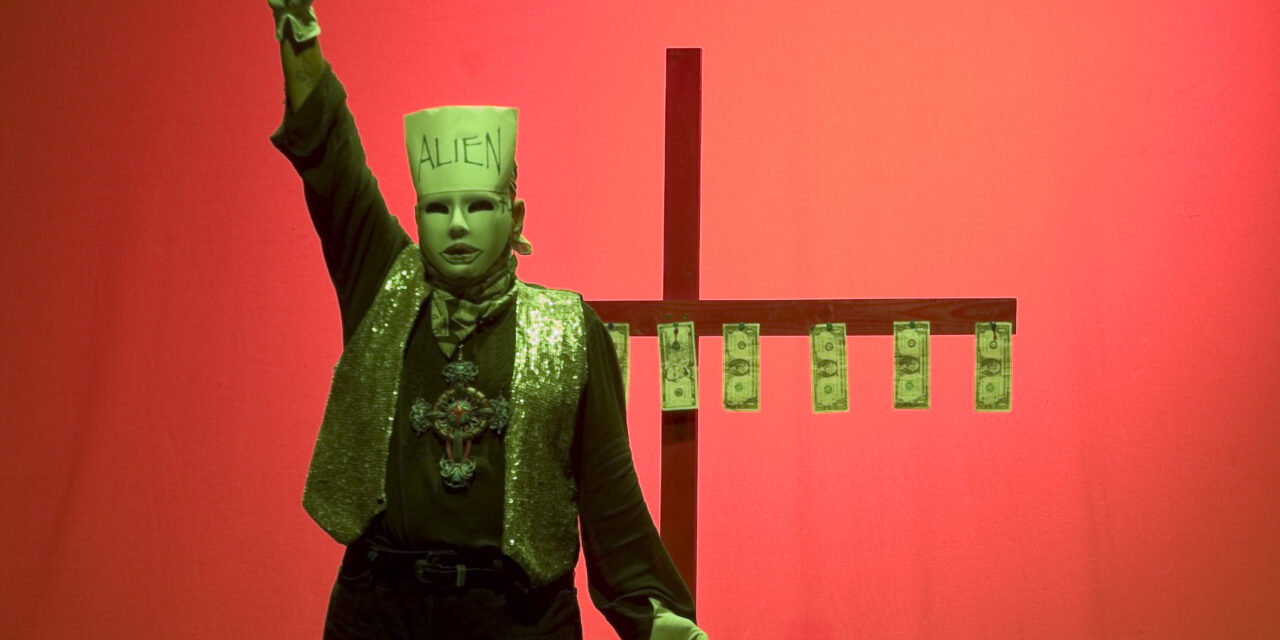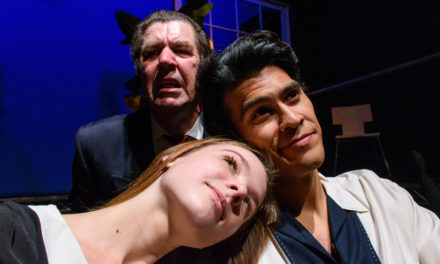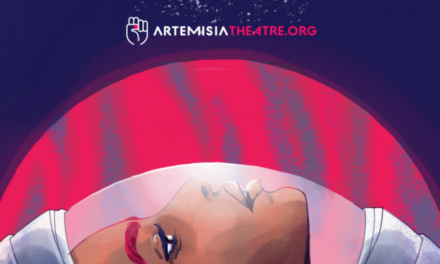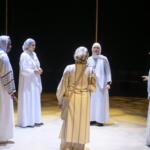On March 29, 2019, pictures surfaced of undocumented Latin American immigrants in El Paso, Texas. As has become the norm during the Trump Regime, these people were not treated humanely, but rather were seen behind chain-link fencing complete with barbed wire, in a temporary outdoor detention camp under a bridge where people are sleeping on the dirt. While we can say this about the United States at nearly every juncture of this nation’s history, this is America. This is the land of freedom, the land of Lady Liberty vowing:
“Give me your tired, your poor,
Your huddled masses yearning to breathe free,
The wretched refuse of your teeming shore.
Send these, the homeless, tempest-tossed to me,
I lift my lamp beside the golden door!”
This is what performance artist José Torres-Tama calls “The United States of Amnesia.”
The plight of the United States’ undocumented Latinx community is precisely where José Torres-Tama’s performance piece Aliens, Immigrants & Other Evildoers finds its teeth. While Torres-Tama has been doing this type of work for several decades, calling himself the “only Ecuadorian performance artist,” Aliens strikes a larger chord. The performance is timely, intelligent, heart-wrenching, thought-provoking, and quite funny. In Aliens, audiences are able to see a performance artist at the top of his game. In what follows, I discuss Aliens, specifically focusing on the April 5, 2019 performance at MECA in Houston, Texas. Notably, MECA helped develop the show, making this a fitting return to Texas’s biggest city. As a featured performance during the national Latino Art Now! Conference, the sold-out performance I attended was filled with a responsive audience, largely comprised of the Latinx community. Judging by my own experiences in tandem with conversations I had following the performance, this is a show that will stay with people.
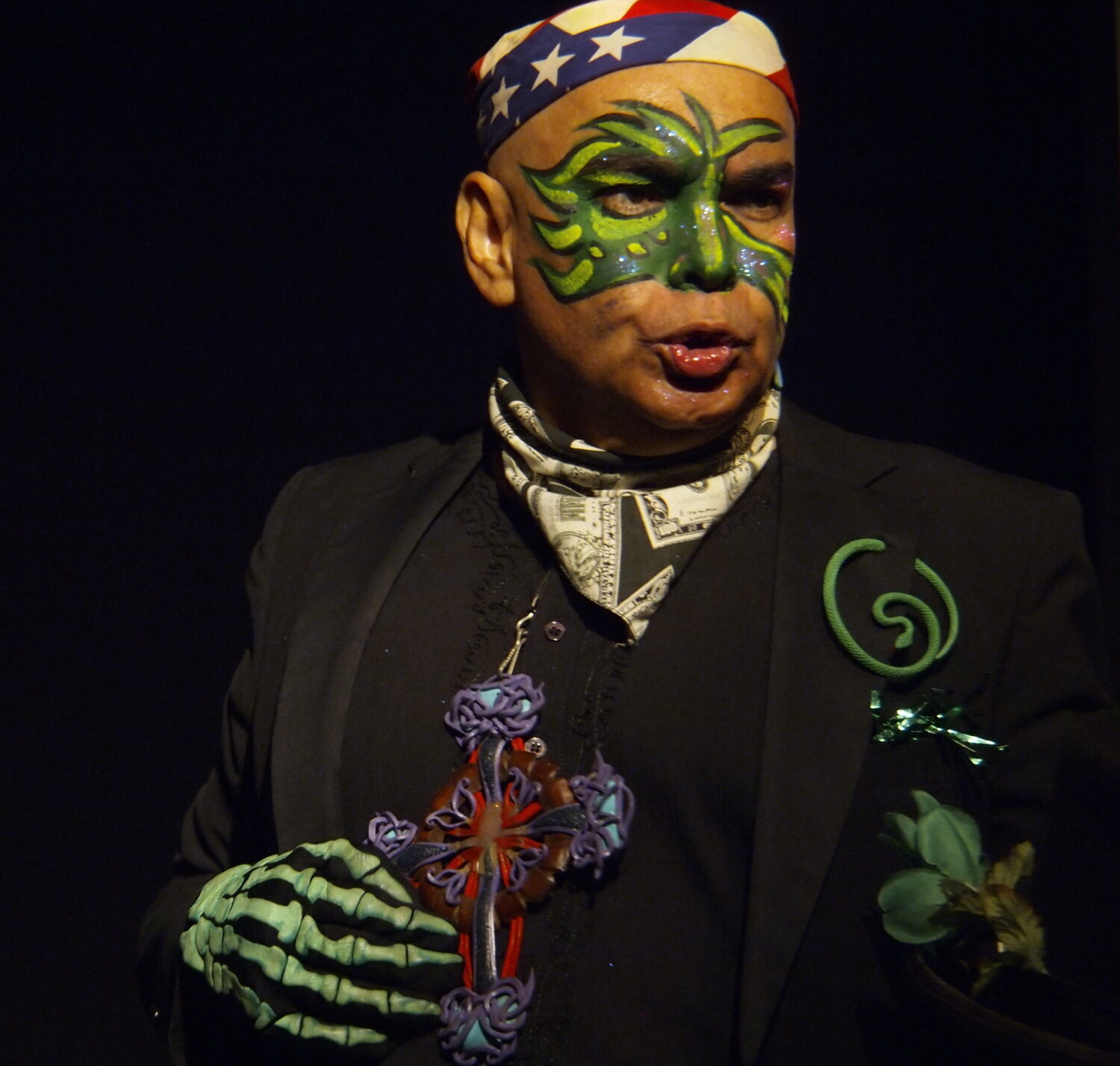
José Torres-Tama. Photo courtesy of the artist.
I first came into contact with Aliens at the Encuentro Theatre Festival, produced by the Latino Theater Company at the Los Angeles Theatre Center in 2014. While I missed the production, I became intimately connected to the show in a number of ways. Namely, the piece is featured in my upcoming book, Encuentro: Latinx Performance for the New American Theater, which will be published in May 2019 with Northwestern University Press. When my co-editors—Teresa Marrero and Chantal Rodriguez—and I were deciding which plays to include in the book, Aliens was a no-brainer. We knew this was a performance that needed a wider audience and one that needed to be documented. To put it simply, Aliens is a necessary theatre that sparks conversations about the hardships faced by the undocumented community and asks audiences to consider what we might do to address these inadequacies.
Billed as a “Sci-Fi Latino Noir Performance Solo,” Aliens riffs off the term “illegal alien,” effectively satirizing the notion of Latinx immigrants as “aliens.” Written, directed, and performed by Torres-Tama, the play tackles a wide array of themes, while remaining a tight show in its exploration of the rise of hate crimes and hateful rhetoric against the Latinx community. Using a combination of monologues, performance tactics, costumes, sound, and colorful stage makeup, Torres-Tama smoothly transitions between several Latinx “extraterrestrials” who speak to how immigrants, both US citizens and undocumented, are vilified even though these individuals create the backbone of this country.
Maybe it is because I was born and raised in New Orleans, but I found that Torres-Tama was most successful in doing this via his dramatization of the Latinx community in New Orleans in the aftermath of Hurricane Katrina. As Torres-Tama has written about on HowlRound, the Latinx community by and large rebuilt New Orleans. Once the rebuilding was finished, many folks decided to make “the city that care forgot” their new home. Perhaps in another timeline, this story ends differently, but what happened has become standard in this country. New Orleans, a city with little to no ICE presence before, has suddenly become an unsafe city for undocumented people. Specifically, the city has repaid Latinx workers via ICE raids and deportations. In Aliens, Torres-Tama embodies several undocumented characters who helped rebuild New Orleans. Inspired by ethnographic interviews with immigrants, these stories form the backbone of the performance script and allow the performer to demonstrate the humanity of a community that risked their lives as political and economic refugees to come to a country that has given them anything but the so-called “American Dream.”
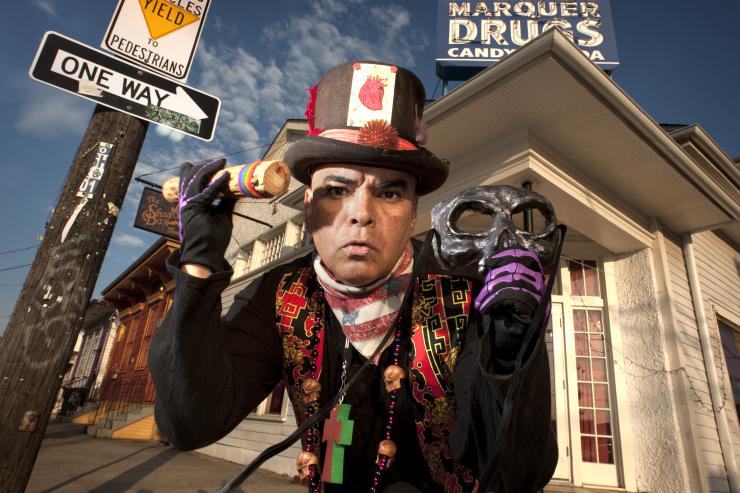
José Torres-Tama. Photo courtesy of the artist.
Given that the piece first debuted in 2010 and is still being performed across the country, Aliens is a flexible piece of performance art that is constantly morphing and remaining responsive to the current political climate and the venue in which the show is being performed. As such, since the 2016 Presidential Election, Torres-Tama has updated the script to reflect the increased struggles that the Latinx community has faced in the United States of Amnesia. This continued updating of the script ensures that Aliens will remain a timely intervention (at least until Torres-Tama stops performing the show).
At one moment in Aliens, Immigrants & Other Evildoers, Torres-Tama walks through the audience quite literally holding a mirror up to society. While the mirror never landed on me, the entire performance did just that. In the end, I was left to question my own role in the capitalist systems that plague the undocumented community. While we all can do work that matters, que vale la pena, we must remain responsive and alert. We truly do live in a country marked by amnesia. While certain atrocities make headlines—such as the undocumented children who died in detention camps during the Christmas holidays—all too often we “forget” and move on to the next instance of hate. José Torres-Tama asks us to look beyond these instances and instead look at the systems that have created a country that supports this work. Only then will we be able to move forward into a new era, not marked by amnesia, but one marked by remembering.
This post was written by the author in their personal capacity.The opinions expressed in this article are the author’s own and do not reflect the view of The Theatre Times, their staff or collaborators.
This post was written by Trevor Boffone.
The views expressed here belong to the author and do not necessarily reflect our views and opinions.

